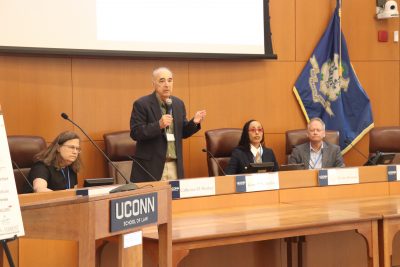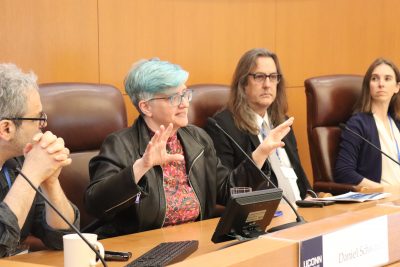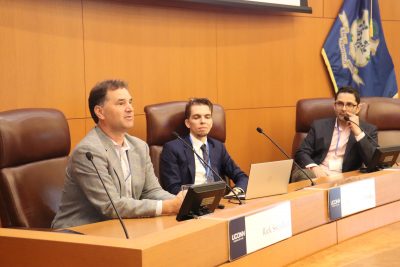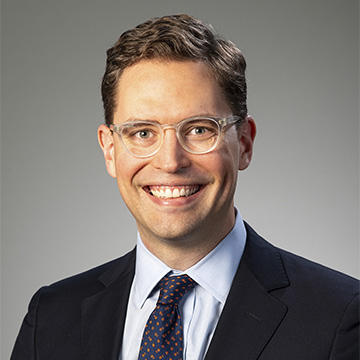Stay Tuned!
Exciting things are on the horizon! Stay tuned for upcoming events hosted by the Insurance Law Center—featuring expert panels, networking opportunities, and timely discussions at the intersection of law, business, and innovation. Check back soon for details!
Faculty Profile: Bill Goddard
As an undergraduate at Dartmouth, Bill Goddard enjoyed working at the student radio station—an experience that later helped shape his early professional life, though his career ultimately took him far from broadcasting.
After earning an MBA, he worked on Wall Street as an investment banker during the era that inspired Wall Street’s Gordon Gekko. “It was one heck of a ride in those days!” says Goddard.
He and a classmate later acquired and expanded a small regional radio company, turning around struggling stations before selling the business. The sale gave him the freedom and resources to pursue a long-standing interest in law. “Founding and selling that company gave me the money to go back to school, and the freedom to study what I wanted,” he says.
Goddard chose the University of Connecticut School of Law because it had the nation’s leading insurance law program—and because he wanted to study with Professor Tom Baker. “I really loaded up,” Goddard recalls. “I took Insurance Regulation, Liability, Transactions, Taxation—the curriculum at the Insurance Law Center gave me an enormous toolkit.”
Baker, now at the University of Pennsylvania Carey Law School, immediately recognized Goddard’s promise. “I still remember meeting Bill during his first semester at UConn,” Baker says. “Right after he left my office, I called up Hal Horwich and told him, ‘You have to hire this guy for next summer.’” Horwich, then a partner at Hebb & Gitlin, initially resisted— “We don’t hire 1Ls for our summer program”—but Baker persisted, and Horwich relented. They did, and they didn’t regret it.
“It’s like a bankruptcy on Mars.” — Hal Horwich, as quoted by Bill Goddard
After law school, Goddard clerked on the Second Circuit for Judge Jon Newman— “the most amazing experience intellectually,” he says. “It was like drinking the law from a firehose.” He then returned to Hebb & Gitlin (later Bingham Dana & Gould, and eventually Bingham McCutchen), where he became an expert in insurance, reinsurance, and insurance insolvency. His banking background proved invaluable during major insolvency proceedings, especially during the 2008 financial crisis.
Baker kept an eye on his former student’s career. “And as soon as it was decent, we brought him back to UConn to teach,” Baker recalls. Goddard joined as an adjunct professor in 2008, now marking his eighteenth year in that role.
“I drink my own Kool-Aid,” Goddard says. “Insurance is an elaborate legal structure built around betting on fortuitous events—and who doesn’t like betting on fortuitous events?”
For his first decade teaching at UConn Law, he co-taught Insurance Litigation with John Buchanan and Stuart Rosen (now a Connecticut Superior Court judge). In 2016, he was asked to develop and teach a course on Insurance Solvency Regulation. “When it comes to insurance, I’m always happy to rise to the occasion,” he says. The course quickly became a staple and a student favorite.
“Instead of going bankrupt, insurance companies that fail enter into insolvency proceedings. The process is governed by regulations in individual states rather than the federal bankruptcy code,” explains Goddard. “European lawyers just giggle—our system makes no sense to them. It’s like a bankruptcy on Mars,” he adds, quoting his former mentor Hal Horwich.
In the class, students dissect the structure of the U.S. regulatory system and put themselves in the shoes of regulators or legislators, debating how to address complex, real-world case studies. These “yeasty intellectual questions,” as Goddard calls them, raise constitutional and sovereignty issues that make the subject ideal for deep legal analysis.
Regulators, examiners, and representatives from the Federal Reserve are regular visitors. “So many of the rules and practices of insurance insolvency just aren’t written down,” says Goddard. “Talking directly with regulators gives students that subjective feel and a better overall understanding of the enterprise.”
David Axinn, Special Deputy Superintendent at the New York Liquidation Bureau—and now co-instructor of the Insurance Solvency course—is a frequent classroom collaborator. “Bill makes the case that insolvency is the key to understanding insurance regulation,” Axinn says. “He is a lone voice in the insolvency wilderness.”
Former student Alison Weir, now a staff attorney at Greater Hartford Legal Aid, says, “Insurance solvency sounded pretty dry initially, but it’s so much more dynamic than I had imagined.”
Technological change continues to reshape the insurance world. Goddard had planned to teach a course on insurance technology outside of UConn Law, but when that did not go forward, the Law School then greenlit his new offering, InsurTech Start-up Law, now in its second year.
Goddard hopes more students will explore insurance law’s breadth and impact. “UConn Law and the Insurance Law Center have been wonderful places for people like me,” he says. “Whether it leads you to government service, the insurance industry, or private practice, insurance makes for a fulfilling and rewarding career.”
UConn Law, UMN Host Groundbreaking Conference on AI and Insurance
UConn Law and University of Minnesota Successfully Host Groundbreaking Conference on AI and Insurance
HARTFORD, Conn. (May 31, 2025) – The Insurance Law Center at UConn Law, in partnership with the University of Minnesota Law School, successfully hosted a conference on “AI, Insurance Law, and Regulation” on May 30, 2025, at UConn School of Law’s Hartford campus.
The hybrid event brought together more than 200 leading academics, practitioners, regulators, and students to explore critical issues at the intersection of artificial intelligence and insurance law. Attendees participated both in-person and virtually, examining how AI is transforming the insurance industry and its regulatory landscape.
“The intersection of AI and insurance law raises profound questions that will shape the industry for decades. This conference was really exciting and unique. It brought together the field’s leading thinkers for focused, sustained dialogue rather than the fragmented discussions happening elsewhere. The energy in the room was extraordinary. You could feel that we were witnessing a pivotal moment that will influence how America regulates and insures AI risks for years to come,” said Travis Pantin, Director of the Insurance Law Center at UConn Law.
The day-long conference featured four expert panels addressing crucial topics including how insurance can influence AI development and liability frameworks, current and future insurance coverage for AI risks, discrimination and bias concerns in AI-powered insurance systems, and the use of generative AI in insurance coverage drafting and disputes.
Notable speakers included legal scholars from Yale, NYU, University of Pennsylvania, alongside cutting-edge industry leaders, and regulatory experts.
“We are excited to engage with this elite community to tackle the new AI insurance category with the best legal and academic minds in the world,” said George Lewin-Smith of Testudo, a new insurance company developing insurance coverage for AI risks..
The conference also offered a practical lunchtime session on using AI tools in legal practice, providing continuing legal education credits for attorneys.
“This conference has brought together leading voices in AI, insurance, and tort law for an impactful discussion,” said Renee Henson of the University of Missouri School of Law. “With insurance poised to play a central role in AI regulation, the conference arrived at a pivotal moment, one that will no doubt inspire richer, sharper scholarship in this rapidly evolving space.”
Tom Baker of the University of Pennsylvania Carey Law School added, “It was exciting to hear how insurance entrepreneurs are tooling up to face the threats and opportunities that AI will present.”
“The Connecticut Insurance Law Center brought together a coalition of informed, intelligent, and creative thinkers from a variety of perspectives to discuss Artificial Intelligence, the Law, and Insurance. Participating in this critically important discussion was a pleasure and honor,” said Joan Schmit of the University of Wisconsin-Madison.
Philip Dawson of Armilla AI Insurance and Risk Management said, “The conference, which featured leading scholars, legal and industry experts in AI, insurance, and liability, underscored that innovation in AI-specific underwriting and affirmative coverage is accelerating more rapidly than expected.”
The Insurance Law Center plans to publish selected conference papers in a special symposium issue of the Connecticut Insurance Law Journal, further contributing to scholarship in this rapidly evolving field.



ILC Calls for Papers for Upcoming Insurance Law and AI Conference
INVITATION & CALL FOR PAPERS
Presented by the Insurance Law Center at UConn Law & the University of Minnesota
Conference: Insurance, AI & the Law
Friday, May 30, 2025
8:30 a.m. – 5 p.m. ET
Click here for updated information about this conference, and for the registration form.
Registration Opens for Third Year of Insurance Series
Scholars, lawyers and industry leaders will bring groundbreaking research and fresh perspectives to the New Ideas in Insurance series from the Insurance Law Center beginning Sept. 8, 2022.
The new lineup of online presentations marks the third year of New Ideas in Insurance, and the first in which the series will extend over the course of two semesters. The newly released schedule for Fall 2022 begins with a presentation by Robin Pearson, professor of economic history at the University of Hull in the United Kingdom, on the Lloyd’s insurance market crisis of the 1980s and ’90s. In the sessions to follow, speakers will address conflicts of interests in variable annuities, drug insurance coverage, liability insurance and the tort system, non-rational motives for buying insurance, and the evolving link between jobs and health insurance. Each session will conclude with a full discussion with audience participation.
“It’s a really exciting time to be the nexus of cutting-edge thought about insurance and insurance law,” said Professor Travis Pantin, director of the Insurance Law Center. “The quality of the scholarship has never been higher, and now that virtual workshops have been shown to work, the insurance community has an opportunity to convene on a regular basis in a way that wasn’t really possible before.”
The series, which is free, open to the public, and entirely virtual, will be held on alternating Thursdays from 4 to 5 p.m. ET. Advance registration is required at ilc.law.uconn.edu/new-register.
“The Insurance Law Center has created an exemplary model for bringing scholars and practitioners together with New Ideas in Insurance,” Dean Eboni S. Nelson said. “The continued success of the series is the latest demonstration of how important the center has become to an industry that shapes our lives and choices in so many ways.”
Video recordings of sessions from the first two years’ of New Ideas in Insurance are available on the Insurance Law Center website at ilc.law.uconn.edu/new-ideas.
UCONN Law School Hosts Workshop on Insurance and Policing
HARTFORD, CT: On April 8th, the Insurance Law Center and the Center on Community Safety, Policing, and Insurance held a closed-door symposium on Insurance and Policing at the University of Connecticut School of Law. The workshop welcomed legal academics, insurance practitioners, representatives of risk pools, and law enforcement officials for an open discussion on the influence of liability insurance on law enforcement policy.
“Most people don’t think about insurance as a way of effecting police reform. But there’s a growing body of research suggesting that insurance companies and risk pools might be one of the few mechanisms to make progress in policing right now,” Travis Pantin, Director of the Insurance Law Center, said.
The workshop was inspired by the work of Professor John Rappaport of the University of Chicago Law School, whose scholarship has suggested that insurance oversight and underwriting practices might be able to regulate police misconduct. Deborah Ramirez of Northeastern University Law School also attended the workshop, and shared her scholarship focusing on the possibility that individual liability for police officers—similar to the malpractice insurance that individual doctors must purchase—could help to regulate policing.
Ann Gergen, associate director of the Association of Governmental Risk Pools (AGRiP), attended the workshop and said, “This is an issue that risk pools around the country are very focused on right now. It was very insightful to spend an entire day with a roomful of smart people exploring such a complicated and important topic.”
Kiel Brennan-Marquez, director of CCSPI, noted how “gratifying it was to see our Centers’ overlapping efforts toward reform unfold in real-time. This was the beginning of a big-picture conversation about the role insurance can play in police reform, and we look forward to its continuation over the years.”
Participants spent the day on UCONN’s Hartford campus examining specific insurance mechanisms that influence police behavior, models of assessing liability and coverage for law enforcement, and strategies that would allow for more information-sharing among researchers, police departments, and insurers.
“The public is safest when they trust the police and institutions that support our criminal justice system, and the insurance industry can play an important role in building trust in our institutions,” said Ken Barone, Associate Director of the Institute for Municipal and Regional Policy. “I am confident that UConn Law School will continue to convene challenging conversations that lead to thoughtful reforms and policy solutions.”
“I congratulate Professors Brennan-Marquez and Pantin for organizing such an important and thought-provoking workshop,” Dean Eboni S. Nelson said. “The success of the workshop highlights the importance of engaging with stakeholders from different fields to identify sustainable solutions to advance police reform.”
“Questions like, ‘What do communities expect from our law enforcement professionals today?’ and ‘What role can and should the insurance/reinsurance community play in addressing such issues?’ come with no easy answers. But taking the opportunity to wrestle with those questions is an important step,” said Kevin Williams, Senior Vice President at Genesis Insurance. “I’m glad I was able to participate.”
This was the first in-person event co-hosted by the CCSPI and the ILC.
New Ideas in Insurance Returns for Second Round

Leading experts will present the latest and most compelling ideas in insurance during a series of online presentations sponsored by the Insurance Law Center at the University of Connecticut School of Law.
The 2022 New Ideas in Insurance series will begin on Jan. 20 with a lecture by Hannah Farber of Columbia University about how insurance shaped the founding of the United States. The weekly series will continue on Thursdays from 4 to 5 p.m. through April with presentations by scholars, lawyers and industry experts.
A session on Race and Insurance will be held March 31, featuring Connecticut Insurance Commissioner Andrew Mais, Pennsylvania Insurance Commissioner Jessica Altman, and My Chi To, executive deputy superintendent of insurance for the New York State Department of Financial Services. Other topics will include ransomware insurance, firearm safety, third party moral hazard, adverse selection and the transfer of financial risk from government and businesses onto individual households.
”We’re really thrilled with the intellectually diverse lineup of scholars and practitioners that will be presenting this year,” said Travis Pantin, director of the Insurance Law Center. “This is the second year that we’re doing this, and we’ve learned that organizing fully remote workshops is a great way to bring together the geographically dispersed community of insurance law scholars and practitioners. Our goal is to make this the place that insurance law nerds gather to discuss the most interesting academic ideas circulating today.”
“I’m really looking forward to this series, which promises to be very informative and thought-provoking,” Dean Eboni S. Nelson said. “I applaud Insurance Law Center Director Travis Pantin for building upon the excellence of the center by assembling such a stellar roster of participants who will present on timely and interesting topics.”
There is no charge for attendance, but advance registration is required. A full schedule and registration link are available at ilc.law.uconn.edu/new-ideas, along with recordings of presentations from 2021, the first year of the series.
The Insurance Law Center at the UConn School of Law, established in 1998 with an endowment from the insurance community, is an internationally renowned academic center for the study of law, insurance and risk.
Professor Peter Siegelman Explores Third-Party Moral Hazard
Moral hazard is one of the oldest ideas in insurance economics, and plays a central role in the
business of insurance. As has long been understood, it occurs because the transfer of risk from
the policyholder to the insurer leaves the former with a diminished incentive to prevent or avoid
bad outcomes. This insight profoundly shapes the design of insurance contracts; it has also
played a role in thousands of judicial and regulatory decisions in insurance law and has given
rise to a vast academic literature. But insurance does not just affect the behavior of the insured
policyholder: in many settings, it can influence others who are not parties to the insurance
contract. UConn Law Professor Peter Siegelman and Penn Law Professor Gideon Parchomovsky found that this problem requires careful scrutiny and innovative solutions.
Travis Pantin Named Director of Insurance Law Center
 Travis Luis Pantin has been named director of the Insurance Law Center at the UConn School of Law, also joining the faculty as an associate professor of law.
Travis Luis Pantin has been named director of the Insurance Law Center at the UConn School of Law, also joining the faculty as an associate professor of law.
Pantin’s research concerns the doctrine, history and institutional practices of insurance. His forthcoming article, What Can’t Be Insured: The Policyholder’s Own Bad Acts, analyzes the insurance law principle that one cannot be indemnified against the results of one’s own moral turpitude. Pantin argues that insurance law articulates its own conception of individual responsibility that is distinct from but analogous to similar conceptions that courts use to assign legal liability in the tort or criminal law contexts.
After earning his BA from the University of Chicago, Pantin worked as a a macroeconomics and finance reporter in New York City and Abu Dhabi. More recently, he was an academic fellow at Columbia University Law School. He is a graduate of Yale Law School, where he was the articles editor for the Yale Law Journal.
UConn Law Students Help Keep Tabs on COVID-19 Litigation
The COVID-19 pandemic has unleashed a flood of lawsuits by businesses trying to force insurers to cover virus-related losses. Figuring out what that means to the insurance industry and their policyholders requires a massive data collection effort, which is now under way with the help of four UConn Law students.
The students gather information about state and federal court cases, turning lawsuits filed by a podiatry practice in Pennsylvania or a nightclub in California into data for the Covid Coverage Litigation Tracker. Professor Tom Baker at the University of Pennsylvania Carey Law School conceived and manages the tracker, which is co-sponsored by the Insurance Law Center at the UConn School of Law. His goal is to record the pandemic’s unique case law and provide the data that scholars, practitioners, and historians will need to analyze the litigation.